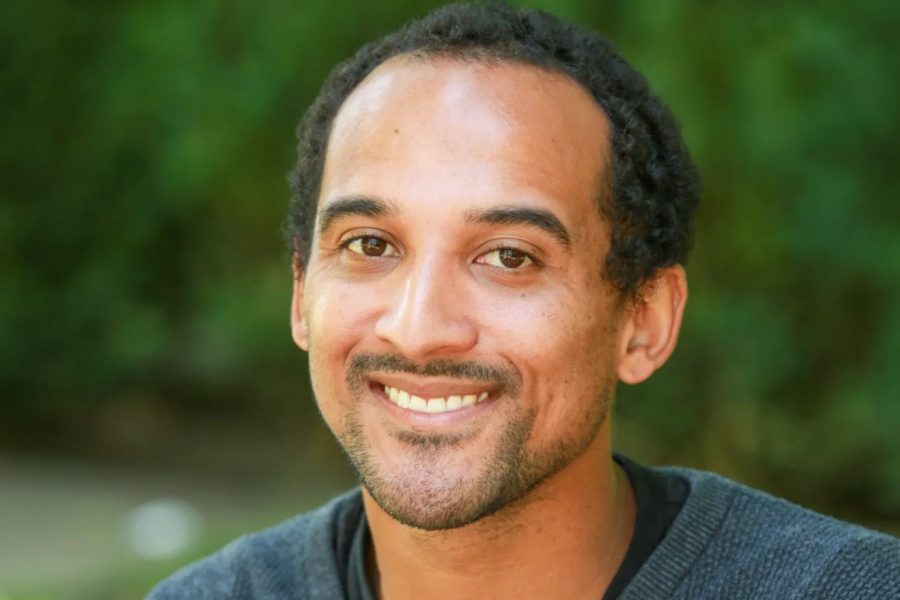Profile: District board candidate Brandon Johnson
Oct 30, 2020
Brandon Johnson, a graduate of High School 1327 and basketball coach at Redwood High School, is a web developer by day and racial justice advocate by night. Johnson is one of five candidates for the Tamalpais High School District (TUHSD) Board of Trustees and aims to bring racial equity and inclusivity to the district through policy, curriculum, and structural changes if elected.
Johnson has the experiences of a former student of color in the district and hopes to implement changes that will make the district more welcoming and inclusive of minority groups and incorporate anti-racist education into academia. “I think vast curriculum changes need to happen as well, and BIPOC [Black, Indigenous, people of color] and LGBTQ+ are, obviously, left quite a bit out of the narrative,” Johnson said. “There’s something environmentally that needs to be taken a look at and changed and adjusted, and the needs of students need to be put first.” The district has recently adopted an anti-racism resolution and established a racial equity task force to identify and suggest ways to remedy systemic racism within the district. “What I’m hoping is that quite a few things will be addressed within the anti-racism task force that the superintendent has set up,” Johnson said.
One aspect of the systemic changes Johnson is passionate about is adapting the school curriculum to include racially and culturally diverse narratives. The TUHSD board policy states that the curriculum should be “consistent with the philosophy, goals, and objectives of the district.” To Johnson, that means “broad changes can be made … in terms of decolonizing the curriculum, making sure there are different perspectives and more views in there,” Johnson said. “As a board member, if that’s not getting done, then I would push to make more clear what our vision and philosophy is,” he added.
Johnson also plans to push restorative justice practices if he becomes a member of the board. “Obviously, we have expulsions and suspensions, [which] seem to point towards disparity amongst different groups. And, I think that there’s just healthier ways of going about student infractions, making sure that we’re not tossing them out of the system, make sure that we still have the ability to teach them at times where they seemingly need to be taught the most,” Johnson said. As part of his involvement with local activist groups, Johnson has advocated for the removal of School Resource Officers (SROs), police officers responsible for “safety and crime prevention in schools.” Johnson stated in an August Marin IJ article, “There is certainly a lot of distrust from the Black and Latinx community with SROs, and for good reason– they are the ones who get targeted most often.”
A significant part of Johnson’s platform is a commitment to centralize student voices in his work as a board member. “Oftentimes, [students are] the closest to the issues and are the first to identify them because they’re experiencing them,” Johnson said. “I’m a huge fan of student input and student decision making, giving them agency.”
Part of Johnson’s emphasis on student input involves budget cuts. The district is facing fiscal insolvency, similar to bankruptcy, if the parcel tax renewal Measure M does not pass in November. If the measure fails, the district would have to make nearly $17 million in budget cuts next school year. The board of trustees has the final say in approving proposed cuts. “I look at the budget pretty much every day and I’m a bit haunted by it because there’s just not a lot of room to make any more cuts … without it affecting students, without laying off teachers,” Johnson said. He added that “it’s [important to] give a heavy ear to students [and] teachers, so that you know exactly what is working for them. And that’s what I would be guided by [when making budget decisions].”
Another topic at the forefront of Johnson’s vision is student wellness, which he hopes to see become more “preventative rather than reactive”. To Johnson, this includes “actively and consistently keeping our students healthy– physically, mentally, [and] emotionally– I think that’s really important,” he said.
Johnson believes that the district’s five school sites can be made more sustainable through the use of technology and new HVAC systems and LED lights. “I think that there’s a lot of changes that we can make to make the facilities themselves more sustainable … certainly with the use of technology,” Johnson said.
If Johnson is not elected to the board, he still plans to continue his work with local activist groups to advocate for changes to the curriculum, policies, and structure of the district. “Win or lose, I’m still going to be battling for the issues that I care about,” Johnson said. “Hopefully it gives folks that look like me the comfort knowing that they belong in these spaces, they belong in these races, and that it’s something they can participate in.”




